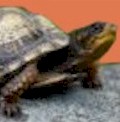Turtles belong to the class of reptiles; what makes the difference from others is the shell, absent in other reptiles. The external shell is known as the carapace, while the interior is known as the plastron. The different species of turtles may be identified by the shape and color of their plastron and carapace. Some species are even characterized by a soft carapace.
The most common species are: the African Spurred tortoise (Geochelone Sulcata), the spotted turtle (Clemmys guttata), the wood tortoise (Clemmys insculpta), the green turtle(Chelonia) the Blunding’s turtle (Emydoidea Blundigii), Trachemys s. elegance (red-eared slider) and the diamondback terrapin (Malaklemys terrapin).
Geocleone sulcata, also known as the African spurred turtle has the particularity of being an unique specie totally adapted for a terrestrial existence. It has an ingenious method to be safe from predators and improper weather: it digs burrows in which it can resist without anything to eat or drink for entire weeks. The water it drinks although equals 15% of the turtle’s weight.
The spotted turtle, or Clemmys guttata is very small. Its shell is black, covered in yellow spots which disappear in time.
They need a strongly humidified environment, so they can mainly be found in marshes, bogs, swamps and fens, but they may also populate other spaces.
The males of this specie have tan chins and brown colored eyes while the females’ are yellow and their eyes – orange.
Usually they are diurnal animals; only in nesting periods the females tend to be very active at night time.
This specie constitutes the favorite food for raccoons, bolt eagles and skunks.
Clemmys insculpta – the wood turtle – may be recognized by its dimensions, bigger than those of other tortoises of the Clemmys family and by the pyramidal structures on its carapace.
It feeds on almost any type of food: blueberries, mice, earth worms, insects, mollusks and algae. Female wood turtles are a little smaller than the males.
Chelonia mydas, commonly known as the green turtle, is different during different ages, especially in its alimentation. The babies are feeding on meat while adults eat only plants. The cubs can be found in proximity of a coral reef, the adults – in places with a lot of algae, roots and small leafs. The favorite things for baby green turtles to eat are bivalves, snails, jellyfish and sponges.
There carapace resembles a heart and their dimensions are medium to large.
Green turtles are mainly aquatic animals that populate the oceans. They are considered to be an endangered specie.
Their gender determination is environmental. The females, which are produced by higher temperatures lay the eggs on solid ground. These eggs have a period of incubation of around 60 days before the new turtles may see the light of day. As it happens with the majority of tortoises, the sex of the specie’s exponents is given by the temperature of the water. Males need lower temperature than females to be produced.
Trahcemys s.elegance, the red – eared sliders find their origins on the southern parts of the U.S. Same as the green turtle, juvenile red – eared sliders are carnivores while adults feed on plants. They can be recognized by a dark green carapace of oval shape and by their middle dimensions. They are green, with yellow stripes on their legs and a red one behind the eye. Their environment is represented by muddy, static waters.
Diamnondback terrapin, scientifically known as Malaclemys terrapin is a little omnivores turtle with a hingeles plastron that varies in color from yellow and green to black and a grey, black or brown carapace.
Their favorite food consists in sponges, carrion, plants, crabs, gastropods and they usually inhabit salt swamps and estuaries.
As a particularity, their nesting is diurnal, especially during the high tide.
